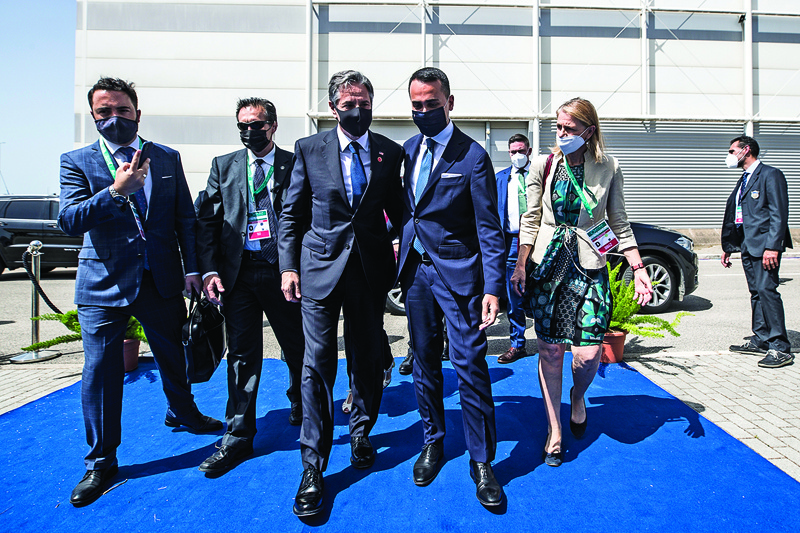 ROME: Italian Minister of Foreign Affairs Luigi Di Maio (right) welcomes US Secretary of State Antony Blinken (left) upon his arrival for a meeting of the US-led coalition against the Islamic State (IS) group, at the Fiera di Roma, in Rome, as part of Blinken's three-nation tour of Europe yesterday.-AFP
ROME: Italian Minister of Foreign Affairs Luigi Di Maio (right) welcomes US Secretary of State Antony Blinken (left) upon his arrival for a meeting of the US-led coalition against the Islamic State (IS) group, at the Fiera di Roma, in Rome, as part of Blinken's three-nation tour of Europe yesterday.-AFPROME: Secretary of State Antony Blinken yesterday pressed US allies to bring back citizens arrested overseas for joining the Islamic State group, warning they could not be held indefinitely in Syria. Blinken made the appeal in Rome at a meeting of an 83-member coalition on defeating the extremist network, where he and the Italian hosts called for greater attention to the jihadist threat in Africa.
About 10,000 suspected Islamic State fighters are being held in northern Syria by Western-allied Kurdish fighters, according to US estimates. "This situation is simply untenable. It just can't persist indefinitely," Blinken said. "The United States continues to urge countries -- including coalition partners -- to repatriate, rehabilitate and, where applicable, prosecute their citizens," he said. France and Britain, two of the closest US allies, have been holdouts against calls to bring back their citizens, which were also made by former president Donald Trump's administration.
Both nations have painful experiences with attacks and see little incentive and plenty of political cost to bringing back radicalized citizens who are already jailed overseas. Blinken praised Italy as one of the few Western European nations to repatriate its citizens and also hailed efforts by Central Asian nations such as Kazakhstan, which he said had brought back 600 fighters and their family members and put them in rehabilitation programs.
According to a Human Rights Watch report in March, the Kurdish-led Syrian Democratic Forces are holding more than 63,000 women and children of suspected Islamic State fighters from more than 60 countries in two camps surrounded by barbed wire. Blinken said the United States was offering another $436 million to care for Syrians, including through housing in camps and for COVID vaccination efforts.
Stepping up efforts in Africa
The Islamic State group has lost almost all of its territory in Syria and Iraq, where it once ran a vast self-styled caliphate marked by an extraordinary campaign of brutality against religious minorities and women. But the extremists are exerting growing force in Africa including in the Sahel, where France is winding down a military campaign, and in Mozambique.
Italian Foreign Minister Luigi Di Maio called on the coalition to form a new working group to address "the growing threat stemming from ISIS in Africa". Blinken said the coalition had put more focus on cutting off financing to extremists in Africa and that two African nations, the Central African Republic and Mauritania, had joined the group with the Rome meeting.
Blinken also announced that the United States was designating Ousmane Illiassou Djibo, a Niger-born Islamic State leader based in Mali, as a "specially designated global terrorist", making any transactions with him a crime under US law. The coalition's ministers are meeting for the first time in person since February 2019, with diplomacy hampered by the coronavirus pandemic.
The coalition was also rocked by Trump's abrupt decision to pull troops out of Syria, declaring that the United States had completed its mission. He eventually kept a small force that is backed by President Joe Biden, in part to stop NATO ally Turkey from launching a new military operation against the Kurdish forces it links to separatists at home. - AFP










